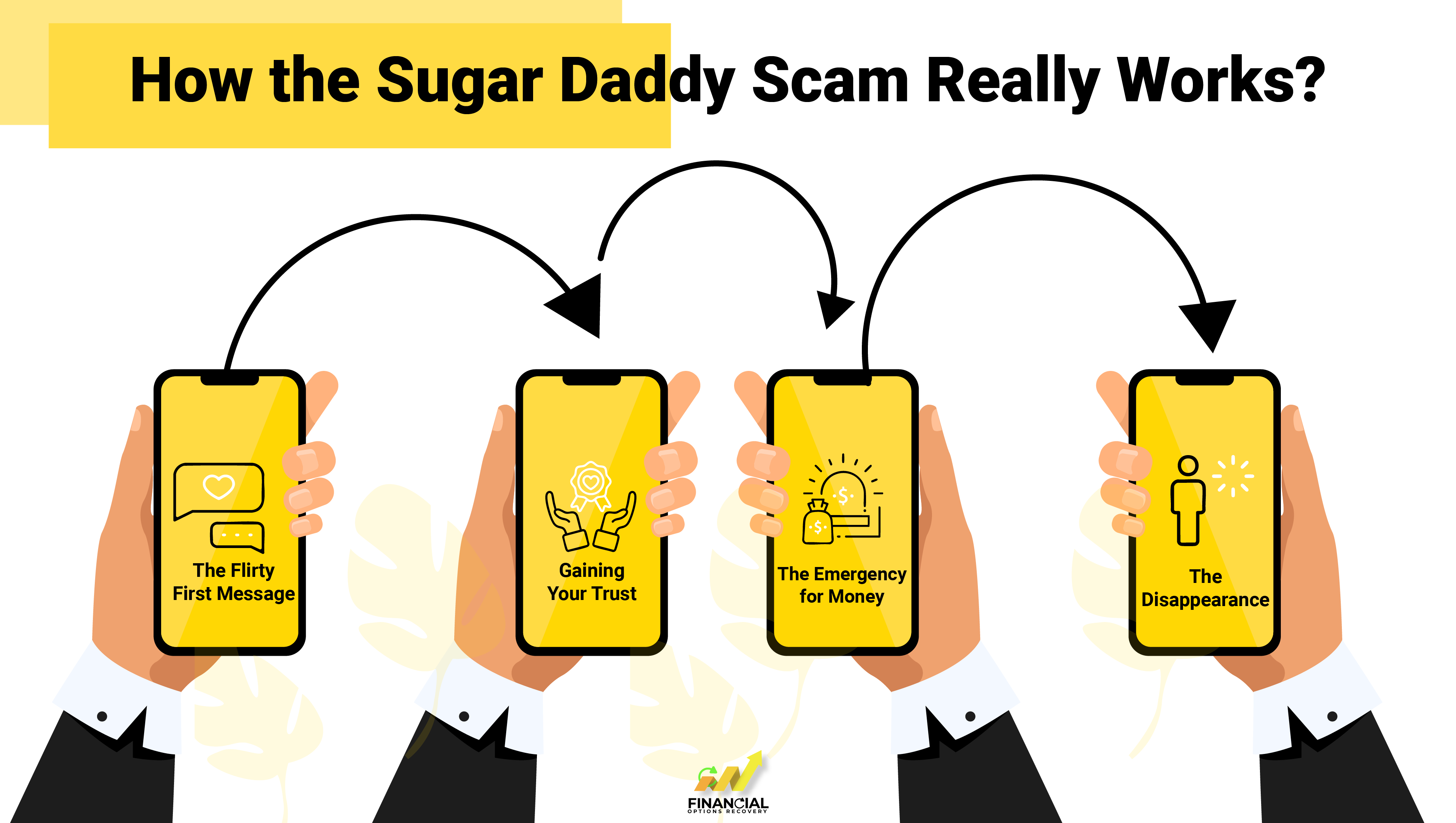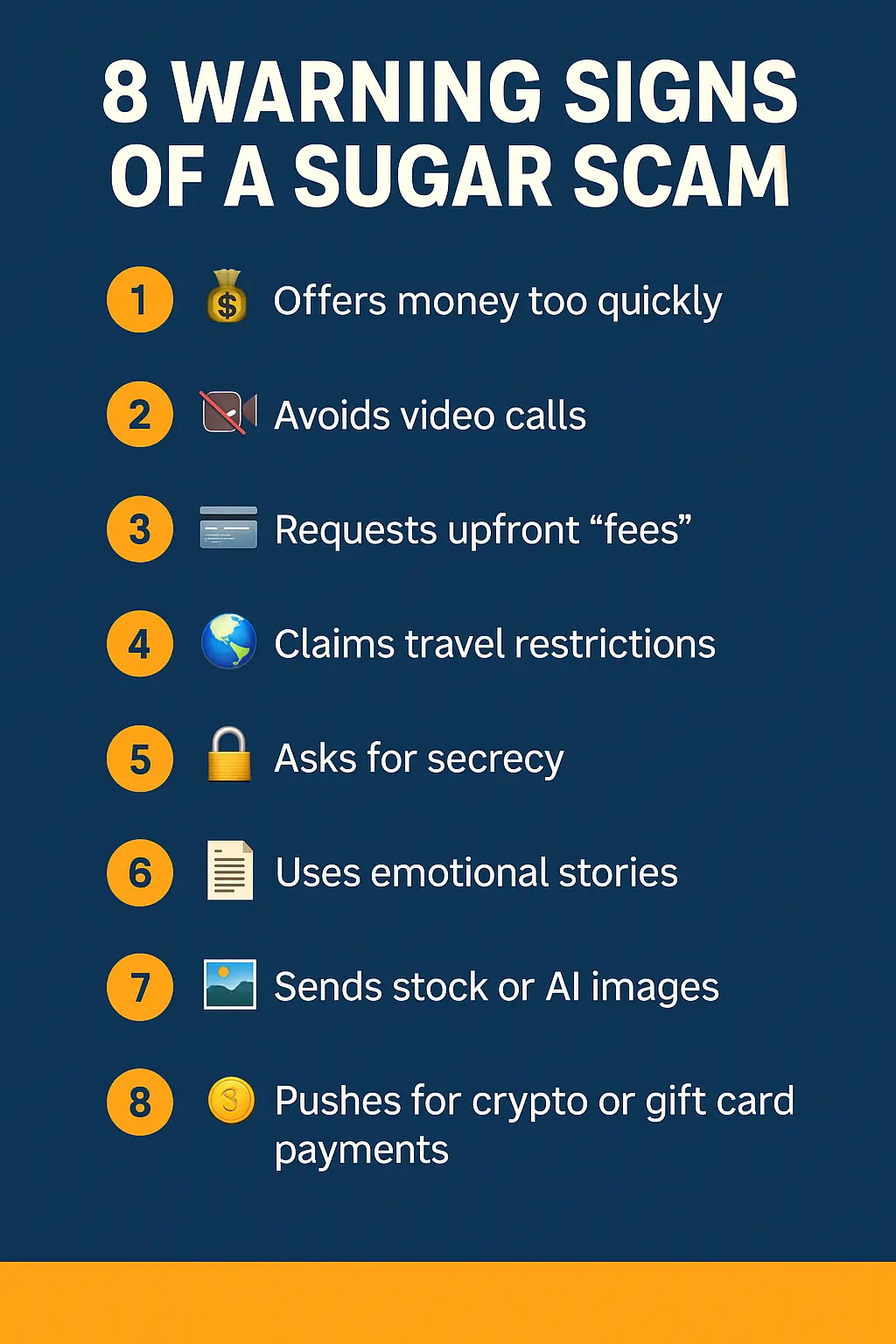
Looking for an arrangement online? Don’t fall for a sugar scam. As online connections grow, so do scams that pretend to be romantic. A sugar baby scam, sugar mommy scam, or sugar daddy scam is when an individual makes it appear as though they are going to provide financial assistance or companionship and then exploit victims financially. These fraudsters take advantage of vulnerable people looking for meaningful connections or financial assistance by using emotional techniques and false promises to establish trust.
In this article, we're going to expose how these sugar scams work, highlight the most prevalent warning signs, and share useful tips on how to stay safe. Whether approached online or on a dating site, knowing what to look out for can be the difference between your safety and damage. Continue reading to avoid being the next victim.
Sugar dating scam definition: Sugar dating typically involves a consensual relationship between an affluent individual—referred to as a sugar daddy or sugar mommy—and a younger companion known as a sugar baby. In this arrangement, the wealthier partner offers financial support or material gifts in return for companionship. Although there are arrangements that are legitimate and aboveboard, scammers use this idea to dupe people into sending money, details, or presents with no intention of following through on their offers.
In a normal sugar daddy or sugar mommy scam, scammers present themselves as big-hearted benefactors on the internet and bait prospective victims—usually young adults, college students, or strapped individuals—with offers of quick money. Rather than money, however, they provide manipulation, emotional deception, and financial disappointment.
Why do these scams appeal to victims:
Knowing the distinction between legitimate sugar dating and illegal scams is essential to safety. In the following section, we will dissect exactly how these scams are executed so that you can catch them early on.

Scammers operating sugar daddy, mommy, or baby scams tend to work within predictable frameworks. Here are the most prevalent methods they employ—and how they function:

They frequently employ stolen or AI photos to compile attractive, affluent profiles. Within days or hours of messaging, they'll offer a weekly allowance—on occasions, hundreds or even thousands of dollars—without ever meeting you. Too good to be true? It is.

You’ll get flooded with flattery, attention, and even claims of love early on. This technique, called love-bombing, is meant to lower your guard quickly. They might say things like, “I’ve never felt this connected to anyone before,” or “You’re different from others.”
Before sending your "allowance," they’ll ask for a “verification fee,” a gift card, or a small crypto deposit to "confirm you're real." Sometimes it's framed as a formality or bank requirement—don’t fall for it. Legitimate benefactors won’t request payment up front.
They’ll often ask you to keep the arrangement secret—either because they’re “a public figure” or “need discretion.” In reality, this keeps others (like friends or family) from warning you it's a scam.
Once trust builds, some scammers pivot into what looks like a partnership—asking you to “invest” in crypto, a startup, or their business, promising high returns. You send money… and they vanish.

Not sure if your online sugar partner is real or a scammer? Use this quick checklist to stay safe:
Request a quick video message or a live video call. Scammers will dodge it with excuses like poor Wi-Fi or "camera not working."
Upload their profile picture to TinEye or Google Reverse Image Search. If the photo shows up elsewhere under different names, it’s likely fake.
If they claim to have wired you money or want to “pay you weekly,” check with your bank before believing it. Be cautious of screenshots—they can be faked easily.
Talk to a friend or post anonymously in an online forum. A second opinion often reveals what you might miss emotionally.
Mini Checklist:
Being safe in the world of sugar dating is not paranoia—it's just being smart. Whether you're contacted by a mommy, baby, or sugar daddy, there are specific safety measures to take before you trust someone online. Scammers usually use emotion, speed, and secrecy to cheat people. Being aware and asking the right questions will save you from losing your heart and your money.
If you've realized you're a victim of a sugar scam, don’t panic—but act immediately. Scammers move fast, and the quicker you respond, the more likely you are to limit the damage or recover your money.
Follow these steps right away:
Cut Off All Contact
Block the scammer on every platform. Don’t respond to guilt trips or threats.
Report the Profile to the Platform
Most dating apps and websites have a “Report User” feature. Flag the account to help protect others.
File an Official Complaint
Report the incident to government authorities:
Notify Your Bank or Credit Card Provider
Tell your financial institution what happened. They may help dispute the charge or freeze the transaction.
Contact a Professional Recovery Firm
Experienced scam recovery services—like ours—can help trace funds, negotiate with platforms, and guide you legally.
Speed is key. Act quickly to lessen the impact.
Being scammed doesn’t mean your money is gone for good. At Financial Options Recovery, we specialize in helping victims of sugar daddy/mommy/baby scams reclaim what’s rightfully theirs. Our team of experts understands the emotional and financial toll these scams cause—and we’re here to guide you through every step of the recovery process.
We offer:
Whether you’ve lost money through crypto, gift cards, or wire transfers, we tailor our approach to your unique case. It’s not just about financial recovery—it’s about getting peace of mind.
Learn more or request your free case review on our Online Romance Scam Recovery page.
A sugar daddy scam is when a scammer pretends to provide money or gifts for companionship, yet actually exploits victims into sending cash or sharing personal details. Sugar daddy scams tend to begin on social media or dating platforms and quickly get out of hand.
A sugar mommy scam is basically the same as a sugar daddy scam, in which a person who is a scammer impersonates an affluent female who can provide financial assistance, only to request "verification fees" or financial information from the victim. Victims are typically emotionally manipulated and promised money quickly.
A sugar baby scam is where a person fakes being a sugar baby in search of a sponsor, but they trick the victim into giving them money, gifts, or sensitive personal details. The scams might employ hijacked photos and extremely affectionate messages to lure victims.
Yes, there is recovery in a few instances—particularly if you are swift. Having a scam recovery company assist you can increase your opportunity to track funds or negotiate with payment systems.
Scammers usually ask for funds under broad terms such as "proof of trust," "account release," or "verification fee." Popular methods of payment are through gift cards, PayPal, cryptocurrencies, or wire transfers—to untraceable or anonymous accounts.
Yes, numerous sugar scams incorporate cryptocurrency since it is difficult to trace and nearly impossible to reverse. Scammers might lie that it's "more private" or "safer," which is a huge red flag.
Stop communication with the scammer at once and report the fraud to the platform and law enforcement authorities. Next, call your bank or a scam recovery company to attempt to recover your losses.
Our trained professionals are here to walk you through recovery and legal recourse, with absolute discretion and tangible results. Don't delay—your next move counts.